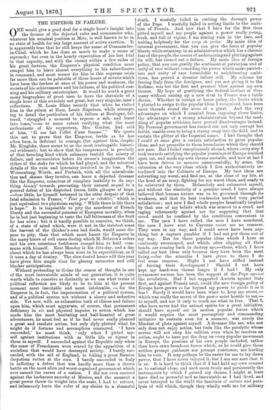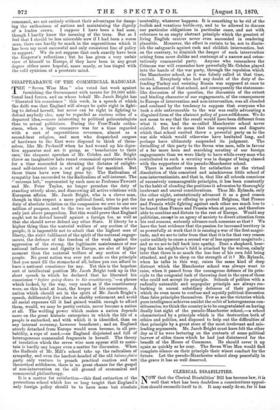THE EMPEROR IN FAILURE.
ONE would give a good deal for a single hour's insight into the dreams of the dejected ruler and commander who, whatever his nominal position at Metz, is well known to be in no state of health for any large amount of active exertion. It is apparently true that he still keeps the name of Commander- in-Chief, which he has done so much to make a name of reproach ; but even in the hourly expectation of his last trial in that capacity, and with the enemy within a few miles of his great fortress, the Emperor's physical condition must compel him to leave almost everything to his subordinates in command, and must secure for him in this supreme crisis far more than can be palatable of those hours of reverie which have been the feeders at once of his power and weakness, the
secrets of his achievements and his failures, of his political cun-
ning and his military catastrophes. It would be worth a great many biographies of great men to have the chronicle of a single hour of this certainly not great, but very singular, man's reflections. M. Louis Blanc records that when he visited him in the prison at Ham, Louis Napoleon, while attempt- ing to detail the particulars of his failure at Boulogne, fal- tered, "struggled a moment to repress a sob, and burst into tears,"—so to some extent verifying what the most enthusiastic of his supporters, Mrs. Gordon, had said of him, 'II me fait l'effet d'une femme.'" We quote this not to prove that the Emperor, feeble as he has often been, is deficient in courage, (for against this, despite Mr. Kinglake, there seems to us the most irrefragable histori- cal evidence); but to show that his temperament is precisely of that brooding kind which enhances tenfold the misery of failure, and accumulates before its owner's imagination the riches of the stake for which he had played, and the minutest details of the ruin and ignominy involved in its loss. For, Weissenburg, Worth, and Forbach, with all the miscalcula- tion and shame they involve, can leave a dejected dreamer like the Emperor, conscious of complete inability to do any- thing himself towards preventing their natural sequel in a general defeat of his dispirited forces, little glimpse of hope, —how little, he himself betrayed in the utter despair of that fatal admission to France, "Tout pent se retablir," which is just equivalent to a physician saying, "While there is life there is hope." It is impossible to pity the murderer of French liberty and the successful poisoner of European morality, when he is but just beginning to taste the full bitterness of the fruit he has sown ; but it is hardly possible to conceive, we think, of a state of mind which, were it not in the strictest sense the harvest of the thinker's own bad deeds, would more dis- pose to pity, than that which must haunt the Emperor in the many hours of evil omen during which M. Nelaton's orders and his own conscious feebleness compel him to hold com- mune with himself. Next Monday is his fête-day, and a day about which he has always been wont to be superstitious, as if it were a day of destiny. The slow-footed hours will this year have given him ample time for gloomy memories and still blacker anticipations.
Without pretending to divine the course of thought in one
of the most inscrutable minds of our generation, it is quite worth while to conceive as distinctly as we can what trains of political reflection are likely to be to him at the present moment most inevitable and most intolerable, — for the Emperor is, in fact, the impersonation of a political system, and of a political system not without a showy and seductive side. Yet now, with an exhaustion both of illness and failure upon him, which must aggravate, of course, that permanent deficiency in vie and physical impulse to action which has made him the most hesitating and half-hearted of great adventurers, he must feel as if he had never really planned a .great and resolute action, but only slyly plotted what he might do if fortune and accomplices concurred. I have succeeded,' he must think, only when I pitted my- self against institutions with as little life or vigour in them as myself. I succeeded against the Republic only when the mass of Frenchmen were scared by the apparition of a socialism that would have destroyed society. I barely suc- ceeded: with the aid of England, in foiling a great Russian
despotism rotten at the core. I barely succeeded in Italy in inflicting a defeat that was hardly more than a drawn battle on the most alien and worst-organized government which ever earned the curses of a nation. I did not even succeed against the barbarous anarchy of Mexico, and the moment a great power threw its weight into the scale, I had to retreat, and infamously leave the ruler of my choice to a shameful 1
death. I woefully failed in curbing the decrepit power of the Pope. I woefully failed in setting limits to the ambi- tion of Prussia. And now that I have for the first time pitted myself and my people against a power really young, fresh, and full of vigour, I am staring ruin in the face, and waiting helplessly for the coup de grace. My main idea of internal government, that you can give the form of popular liberty while retaining, in an administration which has a chronic fear of the people, the means of underminingand plottingagainst its will, has turned out a failure. My main idea of foreign policy, that you can gratify the sentiment of patriotism and of unity of race without conceding the power which make patriot- ism and unity of race formidable to neighbouring ambi- tions, has proved a drearier failure still. My scheme for freeing Italy from the foreigner, and yet not giving it to the Italians, was but the first and greatest blow against my own throne. My hope of gratifying the federal instinct of Ger- many without raising up a new rival to France was a futile dream. Whether in foreign or home policy, the limits which I plotted to assign to the popular ideas I recognized, have been mere threads round the arms of a giant. And the very advantages on which I counted from imposing those limits, the advantages of a strong administration beyond the med- dling of popular criticism, have proved disadvantages instead. My Personal government has turned out not only corrupt but feeble, unable even to bring a strong army into the field, and to sustain the glitter of the Imperial name. I had thought that I could at once give a certain satisfaction to great popular ideas, and yet prescribe to them boundaries which they should not pass. But I failed conspicuously abroad, where every step I took towards satisfying the popular yearnings of Europe recoiled upon me, and made my own throne unstable, and now at last I have been driven to menace unsuccessfully, by arms, the extension of the very ideas which I first authoritatively in- troduced into the Cabinets of Europe. My best ideas are subverting my worst, and find me, at the close of my life, at the head of an army, fighting for ray worst ideas, and ready to be subverted by them. Melancholy and exhausted myself, and without the elasticity of a genuine creed, I have always believed that human nature was to be governed through its weakness, and that its best tendencies needed very partial satisfaction ; and now I find whole peoples fanatically inspired by that one of my beliefs which was nearest to a creed, and raging vehemently against me for supposing that that creed could be confined by the conditions convenient to me. The men I have exiled, the men I have murdered, the men I have sent to Cayenne cause me no remorse. They were in my way, and I could never have been any- thing but a vagrant gambler if I had not put them out of my way. But for those popular ideas which I have so cautiously encouraged, and which, after slipping all their bonds, are coming back to destroy me,—those, which I have called my best ideas only because they have been the most living,—for the stimulus I have given to them I do feel some remorse. Might I not have stifled instead of forcing their development ? Should I not have kept my hard-won throne longer if I had ? My only permanent success has been the support of the Pope against the revolution. Had I but supported Austria against Italy first, and against Prussia next, could the new foreign policy of Europe have grown so far beyond my power to guide it as it has ? Surely it would have been wiser to keep my secret,— which was really the secret of the power most hostile to me,— to myself, and use it only to teach me what to fear. That I, who have never had the animal spirits for a great initiative, should have myself set in motion popular forces which it would require the most peremptory and commanding initiative to restrain even for a moment, was surely the blindest of plots against myself. A dreamer like me, who not only does not enjoy action, but feels like the paralytic whose nerves will not obey his volition even when he resolves on action, ought to have put the drag on every popular movement in Europe, the passions of his own people included, rather than have sown broadcast forces which, as he could give them neither prompt guidance nor prompt resistance, are hurling him to ruin. It may perhaps be the easier for me to lay down power, that I have never enjoyed it, but I am not sure that it is so. It is hard to think that if I had held my own counsel as to national ideas, and used more freely and persistently the instruments by which I gained my throne, I might at least have died as powerful and as inscrutable as I had lived, and never betrayed to the world the lassitude of nature and para- lysis of will which, though they wholly unfit me for military command, are not entirely without their advantages for damp- ing the enthusiasm of nations and maintaining the dignity of a leaden crown. I suppose I have been a bad man, though I hardly know the meaning of the term. But as I feel that I should be less miserable now if I had been a worse man, there can hardly be much in the superstitions which it has been my most successful and only consistent line of policy to support.' We do not suppose that such exactly have been the Emperor's reflections ; but he has given a very unfair view of himself to Europe, if they have been in any great degree either more hopeful, more manly, or less tinged with the cold cynicism of a prostrate mind.































 Previous page
Previous page